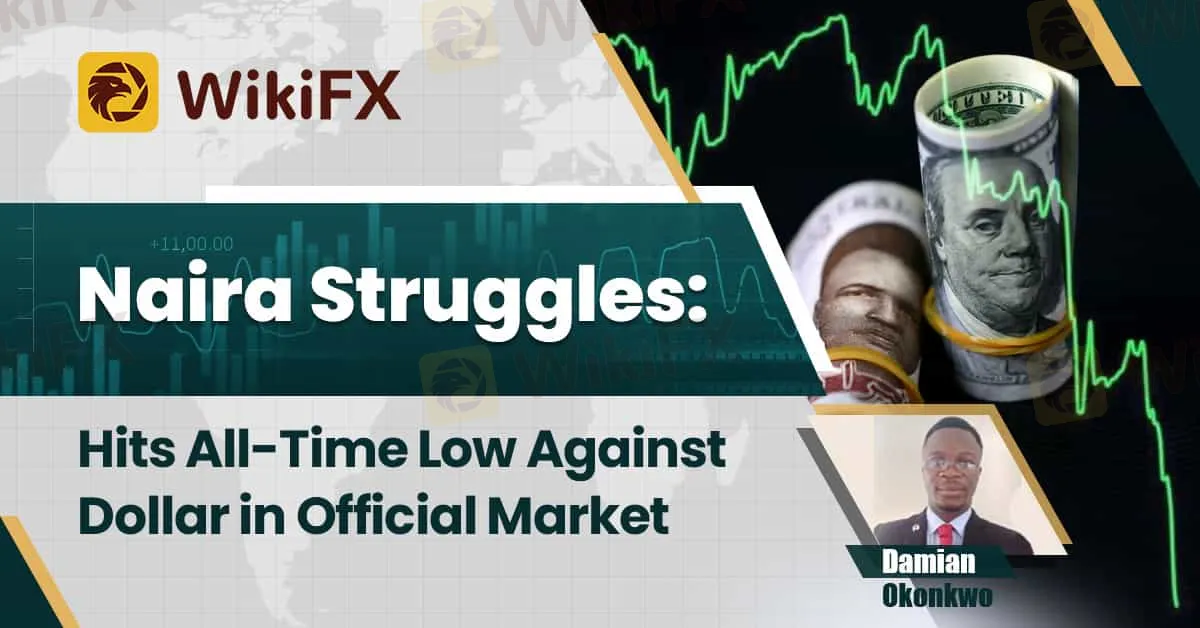简体中文
繁體中文
English
Pусский
日本語
ภาษาไทย
Tiếng Việt
Bahasa Indonesia
Español
हिन्दी
Filippiiniläinen
Français
Deutsch
Português
Türkçe
한국어
العربية
Naira Struggles: Hits All-Time Low Against Dollar in Official Market
Abstract:The Naira's struggles are a complex issue with no easy solutions.

By: Damian Okonkwo

The Nigerian Naira has faced serious challenges since 2024, reaching record lows against the US Dollar in both the official and parallel foreign on February 20th, 2024; to trade at the lowest rate ever at N1,620.96 per $1 on the FMDQ Exchange, which is the official platform for official foreign exchange trading.
The situation seen in the parallel market, a less regulated space, is even more concerning. Here, the Naira crossed the N1,750 per $1 mark, to nearly N2000 per $ same day, further highlighting the pressure on the currency.
Factors Contributing to the Decline:
There are many factors that may have contributed to the current devaluation of the Naira. These includes:
A. Dollar scarcity: The primary driver of the Naira's depreciation is the limited availability of US Dollars in the Nigerian market. This scarcity could be attributed to:
● Lower oil revenue: Oil exports are a major source of foreign exchange for Nigeria. However, a decline in global oil prices and production issues have restricted this income.
● Increased demand for dollars: The demand for dollars has risen due to factors like:
● Import dependency: Nigeria relies heavily on imports, requiring foreign currency for purchases.
● Capital flight: Investors and businesses are shifting their funds outside Nigeria due to economic uncertainties, further reducing dollar availability.
B. Central Bank of Nigeria (CBN) policies: The CBN's attempts to manage the situation through:
● Multiple exchange rate system: Maintaining different exchange rates for different transactions has created complexities and uncertainties in the market.
● Currency controls: Restricting access to foreign exchange for certain individuals and businesses has impacted accessibility and transparency.
The Impact on the Economy
The Naira's depreciation has widespread negative consequences:
a) Import costs: Higher exchange rates make it more expensive to import goods, leading to inflation, impacting the cost of living for Nigerians.
b) Investment climate: Uncertainty in the foreign exchange market discourages foreign investment, hindering economic growth.
c) Savings and purchasing power: The declining value of the Naira weakens the purchasing power of individuals and businesses holding Naira, impacting their savings and investments.
The Response:
The CBN has taken steps to address the situation, including:
● Injecting dollars into the official market: The CBN has intervened to increase dollar availability, but the impact of these interventions remains limited.
● Clearing foreign exchange backlogs: Addressing specific forex demands, like backlogs owed to airlines, aims to alleviate pressure in certain sectors.
Possible ways out:
Observing the current situation of the country, experts urge the government to:
● Focus on diversifying the economy: Reducing reliance on oil exports and fostering other sectors can lessen dependence on foreign currency.
● Promote transparency and predictability in foreign exchange policies: Clear and consistent policies can build trust and encourage investment.
Conclusion
The Naira's struggles are a complex issue with no easy solutions. Addressing the underlying factors that contribute to the dollar scarcity and implementing comprehensive economic reforms are crucial for stabilising the exchange rate and fostering sustainable economic growth in Nigeria.

Disclaimer:
The views in this article only represent the author's personal views, and do not constitute investment advice on this platform. This platform does not guarantee the accuracy, completeness and timeliness of the information in the article, and will not be liable for any loss caused by the use of or reliance on the information in the article.
Read more

WikiFX Review: Is IQ Option trustworthy?
IQ Option is catching our eye as it seems to be a trending topic. For those who want to know whether IQ Option is a reliable broker, WikiFX made this article to help you better understand this broker.

5 Questions to Ask Yourself Before Taking a Trade
Before executing any trade, traders should pause and ask themselves critical questions to ensure they are making rational and well-informed decisions. Here are five questions to help you reflect on your strategy, manage risk, and control emotions before entering the market.

Understanding the Impact of Interest Rate Changes on Forex Markets
Interest rates are one of the most influential factors in the forex market, shaping currency values and driving trader decisions. When central banks adjust interest rates, they send ripples through global markets. Understanding how these changes impact currency movements is crucial for forex traders aiming to stay ahead of market trends.
Forex Price Trend Prediction
Come be a Christmas Price Winner! Become a Christmas Price Winner by predicting the fluctuations of Forex and commodities! Dear community friends, as Christmas approaches, we have prepared an exciting prediction activity for everyone — Forex Price Trend Prediction! From December 16 to December 30, showcase your market insights and predict the trends of Forex and commodities for the upcoming period! This activity not only enhances your market analysis skills but also offers the chance to win generous rewards!
WikiFX Broker
Latest News
HTFX Clone Firm Exposed
TradeExpert: A Forex Broker Under Scrutiny
ASIC Sues HSBC Australia Over $23M Scam Failures
Trader Turns $27 Into $52M With PEPE Coin, Breaking Records
Singaporean Arrested in Thailand for 22.4 Million Baht Crypto Scam
Elderly Trader Loses RM2.1M in WhatsApp Forex Scam
Spotware Unveils cTrader Store, Global Marketplace for Algo Creators
Gigamax Scam: Tracking Key Suspects in RM7 Million Crypto Fraud
WikiFX Review: Is IQ Option trustworthy?
IOTA Leads Blockchain Innovation in Southeast Asia by 2025
Currency Calculator


